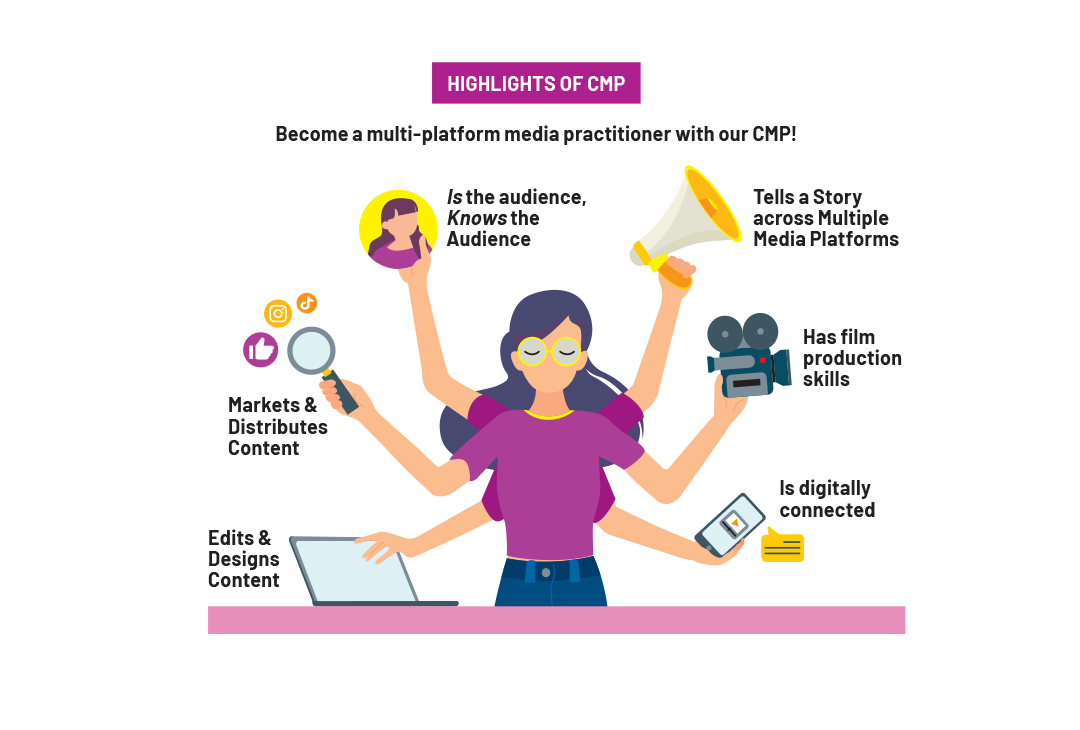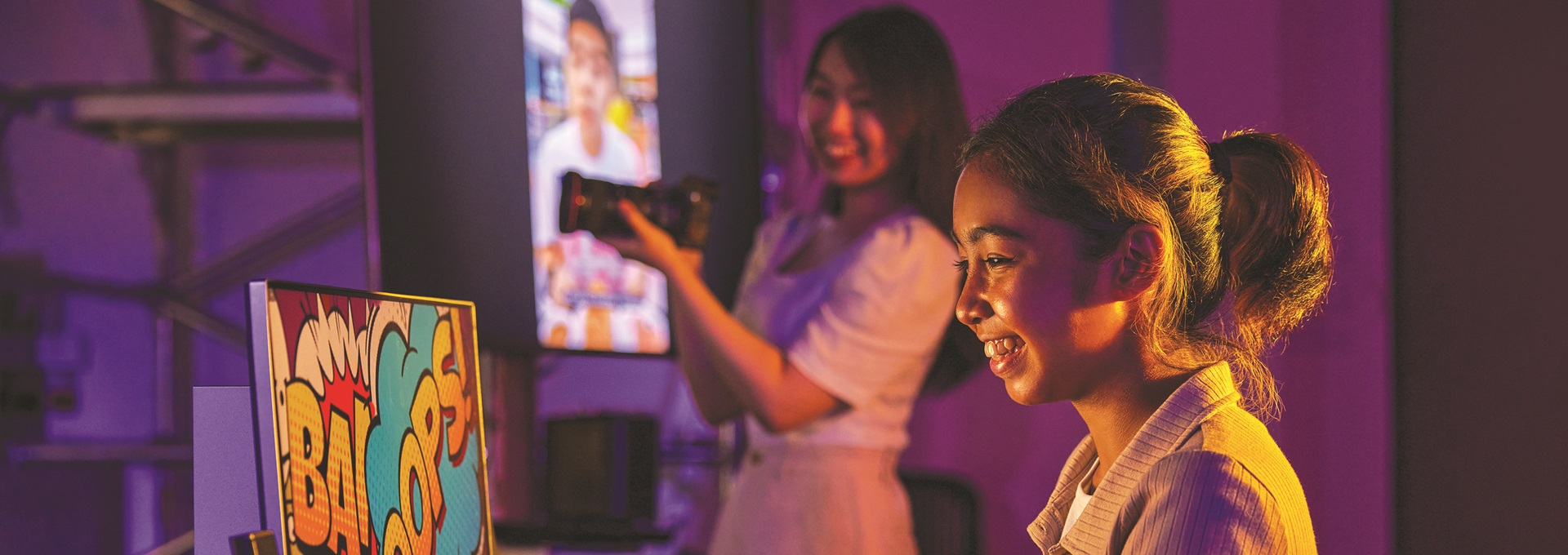Why CMP?
- Your alternative and most flexible gateway to Singapore's original media school
- Gain exposure to different media disciplines and training to be a multi-platform media practitioner
- No exams – work on projects that will enhance your portfolio
- You're a winner either way – guaranteed entry to one of our exciting courses, plus a chance to join our extensive network and make your mark on the media industry and beyond
About CMP
Life is full of hard choices, such as picking one of
the three exciting courses by Singapore’s original
media school. If you want to explore different
disciplines before deciding, then the Common
Media Programme (CMP) is totally for you.
Dive into your first semester with transmedia
storytelling and ‘taster’ modules that introduce you
to our three courses. You will learn diverse content
creation skills for multiple platforms and harness
the power of generative AI to engage audiences.
Discover your unique strengths and career
aspirations through the specially curated Diploma
Exposure Programme, M:idea Fest conference, and
Career & Preparation module.
All our media diplomas are designed to give you
hands-on, industry-relevant experience through
internships and real-world projects. These
opportunities will help you build skills needed to
become a multi-hyphenate media professional,
ready to take on exciting roles across the industry!
What’s more, there are no exams in this course.
Instead, you’ll work on projects that help you
develop a portfolio to showcase your skills. By the
end of your first semester, you will have gained
deeper insights into each area, allowing you to
rank and choose from our three diplomas:
Mass Communication, Film, Sound & Video, or
Media Post-Production.
Highlights of CMP

DID YOU KNOW?
92% of CMP students obtained their preferred course choice.
Entry Requirements
AGGREGATE TYPE ELR2B2-A
To be eligible for consideration, candidates must have the following GCE ‘O’ Level examination (or equivalent) results.
| Subject | 'O' Level Grade |
|---|---|
| English Language | 1-6 |
| Additional Mathematics/Mathematics | 1-7 |
| Any one of the 1st group of Relevant Subjects for the ELR2B2-A Aggregate Type | 1-6 |
Applicants must also fulfil the aggregate computation requirements for the ELR2B2-A Aggregate Type ( English Language, 2 relevant subjects and 2 other best subjects) listed at www.np.edu.sg/docs/ELR2B2.pdf.
Students opting to be streamed into the Diploma in Mass Communication must obtain grade 1 to 4 for O-level English Language.
For students with other qualifications, please refer to the NP website for the entry requirements and admissions exercise
period.
What You Will Learn
Career & Professional Preparation I (1 Credit Unit)
This module gives students a foundational introduction to their three-year diploma course curriculum and how it prepares them for industry. It will help them to embark on their course with the end in mind, through guided reflection of their personal characteristics and producing an overall game plan for heir their future education and career goals. The module aims to deepen students’ commitment to the sector that the course prepares them for.
Introduction to Film & Media (4 Credit Units)
This module examines multi-platform content and the digital platforms and technologies by which the content is delivered (virtual conferences, streaming, blogs, social media, online videos, immersive experiences). Students will appreciate and analyse a variety of media with different perspectives based on multiple platforms to reach an audience. By the end of the module, students will become more literate “produsers” and critics of multi-platform media today.
Motion Graphics (4 Credit Units)
This module gives students hands-on experience in creating motion graphics for digital media. Students will be taught skills such as visual design and the creation of computer-generated graphics in service of multi-platform commercial media productions (video, immersive media, social media, etc.).
Storytelling Techniques (3 Credit Units)
This module scaffolds and synthesises storytelling, functional writing, and research techniques, to create engaging multi-platform content. Through the module, students will be taught the tools to effectively ideate compelling story and content ideas and efficiently craft considered and professional written treatments and proposals, with which to present their content and engage audiences across media platforms.
Integrated Marketing Communications (4 Credit Units)
This module introduces students to the basic principles and concepts of marketing communications, with an emphasis on promotion in marketing. Students will learn about marketing and how its promotional elements must be integrated to communicate effectively. Students will apply basic skills in research and market analysis to plan and develop a marketing communications campaign.
Video Production (4 Credit Units)
This is a foundation module introducing students to single-camera video production. The module gives students hands-on experience with pre-production planning, single-camera operation, location lighting, grip work, sound recording and non-linear video editing. Students will gain an understanding of working with moving images and learn to combine them with simple soundtracks to create compelling content.
Health & Wellness^ (1 Credit Unit)
This is a Level 1 Core module for all Year 1 students. The module will introduce students to the importance of maintaining both physical and mental health through the knowledge and monitoring of health indicators, and application through appropriate exercises. The aim of the module is to empower students with basic knowledge and skills to be independent and responsible in maintaining overall personal health.
^ Critical Core modules account for 10 credit units of the diploma curriculum. They include modules in innovation and world issues, as well as an interdisciplinary project. By bringing students from diverse diplomas together, the interdisciplinary project fosters collaboration to explore and propose solutions for real-world problems. NP aims to develop students to be agile and self-directed learners, ready for the future workplace.
^* For selected students only
FAQs
*Note that we may not be able to allocate all students to their choice courses due to the number of vacancies and other factors. Please see the FAQ on How will CMP students be allocated to courses.
Film, Sound & Video - Candidates with severe vision or hearing deficiency should not apply for the course. Those with a colour vision deficiency are required to declare this condition at enrolment, as certain modules require colour recognition.
Mass Communication - Minimum B4 for English Language
Media Post-Production - Candidates with severe vision deficiency or hearing deficiency should not apply for the course. Those with colour vision deficiency may be considered, subject to passing an in-house test.






